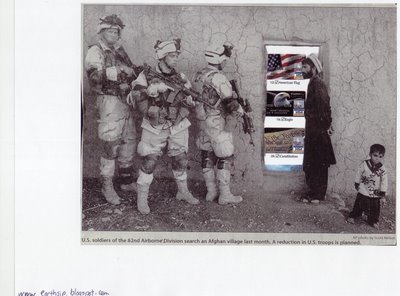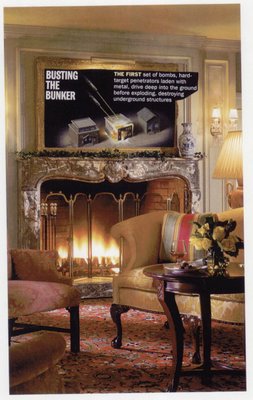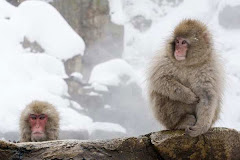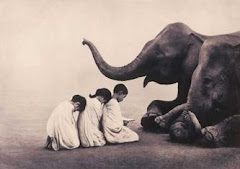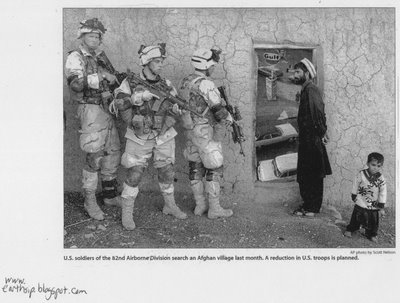
Saturday, September 23, 2006
A simple solution to war and global warming
(by Marina)
A friend of mine, who has just turned 60, is quitting her job, retiring so that she can live on a $734 a month retirement income, thus, living below the federal poverty line, so that she'll no longer be paying taxes that go to support war. She is an utterly amazing woman. When the U.S. military was blaming a lack of yellow "caution" tape" for its failure to protect Iraqi children from abandoned munitions, my friend bought reams of tape and mailed it to them. She has also visited Iraq as a member of a christian Peacemaker team, and in the article she wrote about the experience, she points out that among its many "downsides," war contributes to environmental degradation and global warming. Hoping to minimize her impact on the planet, my friend uses almost no electricity, has no car, avoids recreational travel, and buys locally produced food. In a local newspaper article about her decision to be poor, she says, "It's wrong for people to keep looking for someone to lead us. We all have to take personal responsibility. I want people to know this is an alternative." I would add that to take responsibility is to empower yourself, an invigorating and peaceful act. I only hope I can do so much.
A friend of mine, who has just turned 60, is quitting her job, retiring so that she can live on a $734 a month retirement income, thus, living below the federal poverty line, so that she'll no longer be paying taxes that go to support war. She is an utterly amazing woman. When the U.S. military was blaming a lack of yellow "caution" tape" for its failure to protect Iraqi children from abandoned munitions, my friend bought reams of tape and mailed it to them. She has also visited Iraq as a member of a christian Peacemaker team, and in the article she wrote about the experience, she points out that among its many "downsides," war contributes to environmental degradation and global warming. Hoping to minimize her impact on the planet, my friend uses almost no electricity, has no car, avoids recreational travel, and buys locally produced food. In a local newspaper article about her decision to be poor, she says, "It's wrong for people to keep looking for someone to lead us. We all have to take personal responsibility. I want people to know this is an alternative." I would add that to take responsibility is to empower yourself, an invigorating and peaceful act. I only hope I can do so much.
Wednesday, September 06, 2006
The trees and the forest
(by Marina)
I recently left a job that I had done for nearly six years, a social services government job that meant a great deal to me, that I considered a part of my spiritual practice. This job was, I hoped, a way to practice Thich Nhat Hanh's Fourth Mindfulness Training: awareness of suffering, trying to be present for those who suffer, so we can understand their situation and help them transform their suffering. And this is where the limitations of this job revealed themselves. Being with my clients meant I needed to take the time to listen to them, and be open to what they needed help with, but that wasn't acknowledged as part of the job, really. The "real" job was grilling them for information so I could decide whether or not the government considered them deserving of a monthly sum that most of us would not consider to be enough to do much more than pay rent and buy some very basic groceries. I wasn't there to be a guide or to be present: instead, I was a judge. Either they met the standards for the program, or they didn't, and if they didn't, I wasn't able to refer them to some other potential source of assistance because we had no training in that area at all.
What I learned is that the U.S. social service safety net has a big hole in it, and eventually, I began to feel complicit in this corruption of democracy. The Eleventh Mindfulness Training deals with right livelihood, and reminds us not to live with a vocation that is harmful to humans and nature. Every day, I had to ask myself: Does this work help realize my ideal of understanding and compassion? Is it at least a step in that direction? I barely had time to answer the question; I was too busy working, doing what they wanted me to do. I was becoming cynical, angry, closed off, abrupt and irritable. I wasn't sleeping well, and had little energy to do anything when I got home from work. Being a judge wasn't something that I could stomach any longer...in truth, I was starting to feel like a jailer, herding people back into cages where they could be kept under control and away from more fortunate members of society---as though any one of us couldn't just as easily find ourselves in the same position.
In "Truth or Dare: Encounters with Power, Mystery and Authority," Starhawk poses the question: What would you do, how would you live, if the revolution wasn't something far off, was already here, happening right now? I thought more and more about that...and it became obvious to me that if compassion (instead of the economic bottom line) was designing a world, the job I was doing for the government simply wouldn't exist. I got out of there a few months ago, and feel much better about what I'm doing now, a job at a college, working directly with students. I'm still kind of a judge, but I'm in a better position to help them navigate the system, at least.
I don't understand much about economics, but all around me, I see the evidence: We need to start taking care of people, and, instead of judging them for what they lack, ask ourselves if their basic needs are being fulfilled, and what they have to offer. In the process, we will all benefit.
You can read about the 14 Mindfulness Trainings and see Starhawk's homepage
I recently left a job that I had done for nearly six years, a social services government job that meant a great deal to me, that I considered a part of my spiritual practice. This job was, I hoped, a way to practice Thich Nhat Hanh's Fourth Mindfulness Training: awareness of suffering, trying to be present for those who suffer, so we can understand their situation and help them transform their suffering. And this is where the limitations of this job revealed themselves. Being with my clients meant I needed to take the time to listen to them, and be open to what they needed help with, but that wasn't acknowledged as part of the job, really. The "real" job was grilling them for information so I could decide whether or not the government considered them deserving of a monthly sum that most of us would not consider to be enough to do much more than pay rent and buy some very basic groceries. I wasn't there to be a guide or to be present: instead, I was a judge. Either they met the standards for the program, or they didn't, and if they didn't, I wasn't able to refer them to some other potential source of assistance because we had no training in that area at all.
What I learned is that the U.S. social service safety net has a big hole in it, and eventually, I began to feel complicit in this corruption of democracy. The Eleventh Mindfulness Training deals with right livelihood, and reminds us not to live with a vocation that is harmful to humans and nature. Every day, I had to ask myself: Does this work help realize my ideal of understanding and compassion? Is it at least a step in that direction? I barely had time to answer the question; I was too busy working, doing what they wanted me to do. I was becoming cynical, angry, closed off, abrupt and irritable. I wasn't sleeping well, and had little energy to do anything when I got home from work. Being a judge wasn't something that I could stomach any longer...in truth, I was starting to feel like a jailer, herding people back into cages where they could be kept under control and away from more fortunate members of society---as though any one of us couldn't just as easily find ourselves in the same position.
In "Truth or Dare: Encounters with Power, Mystery and Authority," Starhawk poses the question: What would you do, how would you live, if the revolution wasn't something far off, was already here, happening right now? I thought more and more about that...and it became obvious to me that if compassion (instead of the economic bottom line) was designing a world, the job I was doing for the government simply wouldn't exist. I got out of there a few months ago, and feel much better about what I'm doing now, a job at a college, working directly with students. I'm still kind of a judge, but I'm in a better position to help them navigate the system, at least.
I don't understand much about economics, but all around me, I see the evidence: We need to start taking care of people, and, instead of judging them for what they lack, ask ourselves if their basic needs are being fulfilled, and what they have to offer. In the process, we will all benefit.
You can read about the 14 Mindfulness Trainings and see Starhawk's homepage
Labels:
Buddhism,
peacework,
social change,
Starhawk
Tuesday, September 05, 2006
Monday, September 04, 2006
Labor Day: Do we work for caring or for killing?
"As a kid I dreamt of becoming a doctor. I wanted to help people in my village who did not have the money to pay for even basic health services. I never became a doctor. My family could not afford it. Instead, I worked for the pharmaceutical industry. My job was to peddle the myth that good health can be bought in the form of pills. I was good at it. Money came quickly and easily. One day, a friend asked me to help with health work with grassroots people. It hit me that the lies I helped peddles had mothers scrimping on their family's food to buy medicines they didn't need. Without food---the very thing they did need for their health---many died. They died so that I could have an easy life and drug companies could make huge profits. After four years, I quit my job. My experience taught me that refusing to kill is not only a call to people directly involved in the military machine. It is a call for all of us to consider whether we are complicit in people's death and disability. Do we work for caring or for killing? I am now actively involved in the campaign to put an end to the business of killing lives in the greed for money and power. Like the doctor I never was, I have vowed to use my skills to make people better. The killing business thrives on lies. It is my business now to help tell the truth." ---from www.globalwomenstrike.net
Saturday, September 02, 2006
"Not Left Behind: Rescuing the Pets of New Orleans"
Best Friends Animal Society, the group I worked with after Hurricane Katrina, has just published an amazing new book of photos, "Not Left Behind: Rescuing the Pets of New Orleans," (publication date: August 21, 2006; $19.95 hardcover). Best Friends calls it "a collection of images of hope and stories about happy endings for the pets stranded as the waters rose," by photographer, Troy Snow, who was a member of the first rescue team that scoured the flooded streets of New Orleans by boat, seeking the pets that evacuees had been forced to leave behind. With the typical Best Friends can-do attitude, the press release says: "At a time when the country continues to analyze what went wrong during and after Hurricane Katrina, it's refreshing - and inspiring - to be reminded of what went right. Best Friends Animal Society operates the country's largest sanctuary for homeless animals, and works with its members, and with shelters and rescue groups nationwide, to provide adoption, spay/neuter, and educational programs, and to bring about a time when there will be no more homeless pets." To see photos and find out more about the book, (and order a copy---or two!), go to: http://www.bestfriends.org
Subscribe to:
Comments (Atom)
